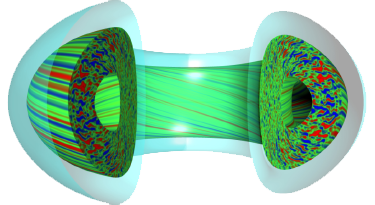Speaker
Description
Recent progress in harnessing novel machine learning (ML) / artificial intelligence (AI) algorithms to enhance EFIT equilibrium reconstruction for fusion data analysis and real-time applications is presented. This includes development of a ML-enhanced Bayesian framework to automate and maximize information from measurements and Model-Order-Reduction (MOR)-based ML models to efficiently guide the search of solution vector. A device-independent portable core equilibrium solver has been created to ease adaptation of ML enhanced reconstruction algorithms. An EFIT database comprising of DIII-D magnetic, motional Stark effect (MSE), and kinetic reconstruction data is being generated for developments of EFIT-MOR surrogate models to speed up the search of solution vector. A parallel Python framework is used to construct input and output vectors for communication with the equilibrium database and training of EFIT-MOR surrogate models. Approaches to improve portability between the OpenMP and GPU EFIT versions are being explored on Linux GPU clusters and the new NERSC Perlmutter to create a performance-portable GPU implementation for further optimization of ML/AI based reconstruction algorithms. Other progress includes development of a Gaussian-Process Bayesian framework to improve processing of input data, and construction of a 3D perturbed equilibrium database from toroidal full MHD linear response modeling with the MARS-F MHD code for developments of 3D-MOR surrogate models.
Work supported by US DOE under DE-SC0021203, DE-SC0021380, and DE-FC02-04ER54698.
| Country or International Organisation | United States of America |
|---|---|
| Affiliation | General Atomics |

